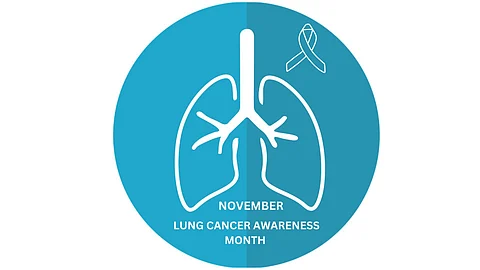

Lung cancer, a global health challenge, accounts for approximately 2.2 million new cases annually, contributing to 18% of all cancer-related deaths as per the International Agency for Research on Cancer. In India, it continues to be a leading cause of cancer mortality. Despite its daunting statistics, advancements in early detection and targeted treatments are reshaping patient outcomes. At the heart of this progress lies precision oncology, a field that leverages genetic profiling to craft personalised treatment plans.
In November, during Lung Cancer Awareness Month, Metropolis Healthcare unveiled a pivotal seven-year study (2015–2021) examining the genetic and clinical landscape of lung cancer. Focusing on genetic alterations in key genes such as Epidermal Growth Factor Receptor (EGFR), Anaplastic Lymphoma Kinase (ALK), and c-ros oncogene 1 (ROS1), by analysing over 3,200 lung cancer cases, the study highlights the transformative potential of molecular diagnostics in improving care for patients, particularly those with non-small cell lung cancer (NSCLC).
Prevalence and Demographics:
Among the analysed tissue samples, 83% were adenocarcinomas and 17% squamous cell carcinomas.
These types predominantly occurred in individuals over 60 years of age.
Genetic Alterations:
EGFR Mutations (29.1%): Found in the Epidermal Growth Factor Receptor gene, with most mutations located in exon 19 (65.6%) and exon 21 (32.1%). These mutations were more frequent in younger and female patients.
ALK Rearrangements (7.8%): Alterations in the Anaplastic Lymphoma Kinase gene were prevalent in younger patients, with no significant gender bias.
ROS1 Rearrangements (3.5%): Genetic changes in ROS1, another target for therapy, were also observed.
Molecular markers like EGFR, ALK, and ROS1 have emerged as critical targets in NSCLC treatment, supported by FDA-approved therapies. Advances in molecular diagnostics, particularly Next-Generation Sequencing (NGS), enable the identification of actionable mutations, opening avenues for targeted and combination therapies.
NGS allows simultaneous analysis of multiple genes, offering comprehensive insights into tumour genetics. This facilitates the identification of additional biomarkers, such as BRAF, RET, MET, NTRK, HER2, and KRAS G12C, as emphasised by the 2023 ESMO guidelines for metastatic NSCLC.
Dr. Kirti Chadha, Chief Scientific and Innovation Officer at Metropolis Healthcare, emphasised the importance of molecular profiling:
“Understanding genetic mutations in cancer-related genes is pivotal for guiding clinicians towards the most effective treatment strategies. This personalised approach ensures therapies are tailored to the patient’s unique genetic profile, significantly enhancing treatment outcomes.”
With evolving guidelines and technological advancements, the role of molecular diagnostics in tailoring treatments will continue to expand, offering hope for better survival rates and improved quality of life for lung cancer patients.
Established in 1980 by Dr. Sushil Kanubhai Shah, Metropolis Healthcare Limited has grown into a leading diagnostics company in India. The company operates a robust network of 124 clinical laboratories and 2,400 collection centers across seven countries, including India. Metropolis offers a comprehensive range of over 4,000 tests and profiles, encompassing advanced diagnostics for cancer, neurological disorders, infectious diseases, and genetic abnormalities. The company's commitment to quality is evidenced by its consistent CAP proficiency score of over 98% over the past decade, placing it among the top 1% of laboratories worldwide for quality assurance. Metropolis emphasizes technological superiority, a patient-centric approach, and reliable diagnostic reports.
Lung Cancer Awareness Month, observed every November, is a global initiative to raise awareness, encourage early detection, and support ongoing research and advocacy efforts. Lung cancer remains one of the most common and deadly cancers worldwide, making this month a crucial period for education and collective action.
Theme
The theme for 2024, “Stronger Together: United for Lung Cancer Awareness,” underscores the importance of collaboration and community support. Whether it’s patients, survivors, caregivers, or healthcare providers, the theme highlights the collective strength required to combat lung cancer through awareness, research, and innovation.
Reference:
1. https://www.metropolisindia.com/
(Input from various sources)
(Rehash/Josna Lewis/MSM)
